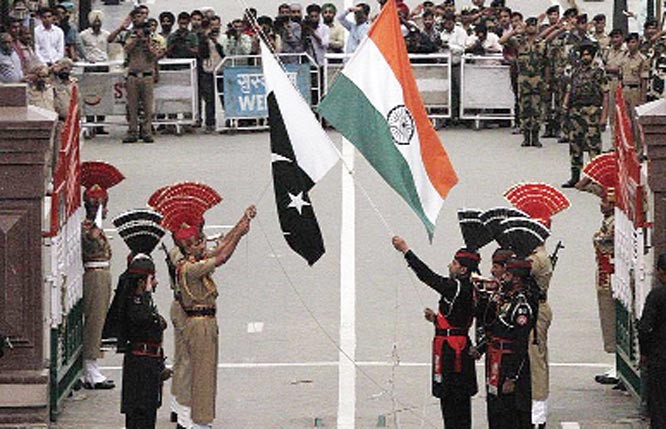
There will be no quick-fixes and a long-drawn-out process is perhaps inevitable

Pakistan has been living since independence in the shadow of India’s hostility and belligerence with a lingering suspicion that India had never reconciled to the sub-continent’s partition. This fear is not exaggerated as Pakistan has seen Sikkim, Goa, Hyderabad, Junagadh and Kashmir falling to Indian avarice. This fear is not exaggerated as Pakistan continues to face India’s hostility and cold-blooded realpolitik. The two countries have fought wars and remain locked in an eyeball-to-eyeball confrontation on the Line of Control in Kashmir and on the frozen landscapes of the Siachen Glacier.
At the time of their independence, India and Pakistan inherited many problems. At the heart of many problems between them is the unresolved Kashmir dispute. As a core issue between the two neighbours, it not only invokes intense feelings among their peoples but is also inextricably linked to peace and security of the region. While all other issues are amenable to easy solutions, the Kashmir dispute invokes intense feelings among the peoples of India and Pakistan as well as the Kashmiri people. Frequent warlike military deployments along the Line of Control in Kashmir have kept India-Pakistan in a conflict mode.
Today, we are witnessing ominous war clouds in our region. Prime Minister Modi’s policy of belligerence has brought the two countries to the brink of another deadly conflict. What we in Pakistan must understand is that weakness always begets indignity. Only a strong and stable Pakistan can withstand India’s open belligerence. This is what Pakistan demonstrated in its befitting response on February 27, 2019 to India’s latest act of aggression on its territory. India’s precipitous action on August 5, abrogating Article 370 of its Constitution, has further aggravated the situation.
Today, Kashmiris feel betrayed. Theirs is the voice of a wronged people challenging the world’s and India’s conscience. They see Indian forces as an occupation agent. They want nothing but freedom from Indian military occupation. Their message is loud and clear. Kashmiri youth are dying on the streets. They are not asking for employment opportunities. They are carrying Pakistani flags. It is a clear verdict. They are showing the world on the streets of the Valley and elsewhere in the occupied territory. This is the crux of the Kashmir uprising.
India will do itself good by acknowledging the writing on the wall. Stark lessons are there to read in history. India’s efforts to obfuscate the Kashmir dispute as an issue of terrorism will not succeed. It is time for the voices of reason and responsibility -- in America, China, Russia, Europe and the Arab and Muslim world -- to caution India against militarism. They must demand strict adherence by all states, large and small, to UN Charter’s central principle prohibiting the use or threat of use of force in international relations.
Kashmir is not merely a territorial dispute. It represents the unfinished agenda of the June 3, 1947 Partition Plan. No government in Pakistan, much less the present one which represents an unprecedented civil-military togetherness, will ever give up the Kashmir cause. The people of Pakistan have welcomed this phenomenon as a long-awaited development. The Pakistan Tehreek-e-Insaf’s Imran Khan came riding in on his personal charisma as well as with a vision of a new Pakistan where its citizens would live their lives and raise their children in dignity, free from fear, want and injustice.
Imran Khan’s foreign policy vision has been very clear. He wants no wars or conflicts. He wants peace with all, enmity with none. No wonder, after his election as prime minister, he pledged to make Pakistan a strong, stable, responsible and a peace-loving country determined to live at peace with itself and with the rest of the world, especially its neighbours. With no tolerance for militancy under any name or on any pretext, Imran Khan foresaw a Pakistan in which economic growth and social justice would reinforce each other.
Prime Minister Imran Khan was keen for good-neighbourly relations with India on the basis of a peaceful settlement of outstanding disputes. He told Prime Minister Narendra Modi that wars will solve no problems. This was his message, loud and clear. Modi never reciprocated this. Instead, he made every effort to fuel conflict. Had Prime Minister Modi been a man of vision, he would have risen above his limitations and joined Pakistan’s new leadership in exploring and expanding peace and cooperation in the region.
Given its turbulent political history, the region needs stable peace, not confrontation. Peace in South Asia will become a reality only if India returns to the negotiating table in good faith and with sincerity of purpose. Perpetuation of hegemony will not serve the cause of peace. As the largest country in the region, the onus is on India to inspire confidence among its neighbours. Peace in our region will come not through shady ‘back-channel deals’ but only through meaningful dialogue and constructive engagement.
Also read: Editorial
For many years, the two neighbours seem to have inextricably tied themselves together in a straitjacket, each mostly looking away from the other. They just can‘t unbuckle themselves and are today rare neighbours in the world perennially locked in a conflict mode, and at times not even on speaking terms. They will have to come out of this unenviable situation and give peace a real chance. The only way forward available to them is to resume their dialogue with sincerity of purpose and commitment.
What we need is an ‘uninterrupted and uninterruptible’ dialogue with freshness of political approach and a commitment to a result-focused engagement. Surely, there will be no quick-fixes and perhaps a long-drawn-out process is inevitable. Peace in South Asia will remain elusive as long as Kashmir remains under Indian occupation. There is but one fair, just, legal and moral solution to Kashmir which was pledged in UN Security Council resolutions, and which both India and Pakistan had accepted. The international community, especially the major powers, must facilitate this solution.